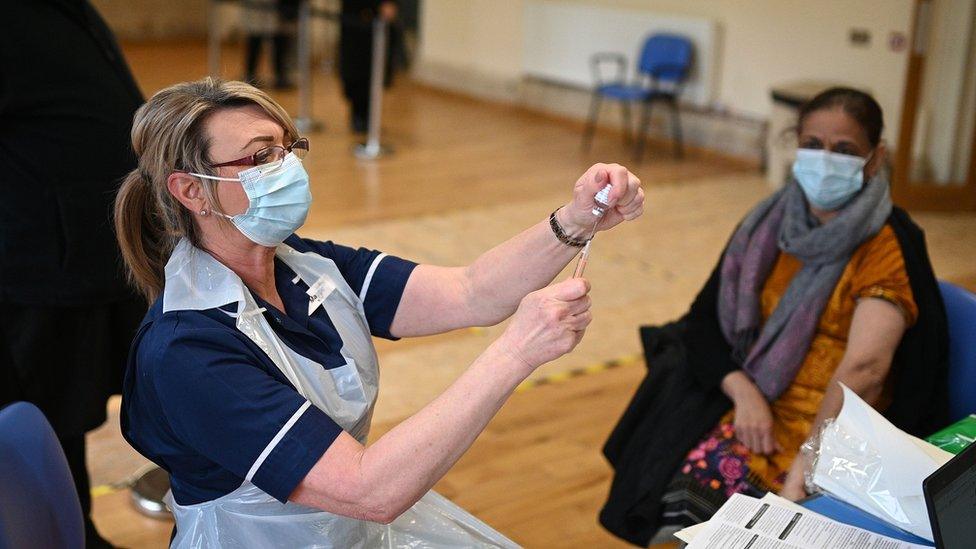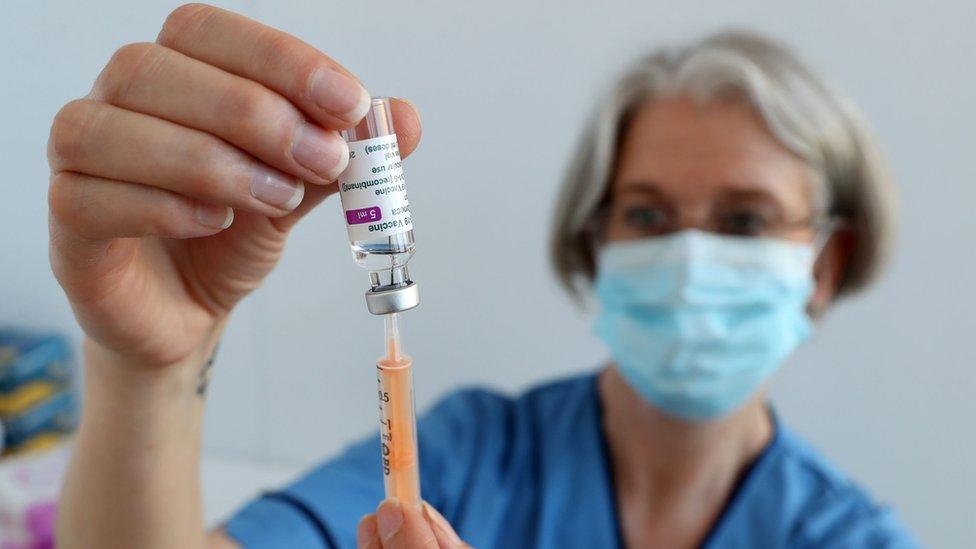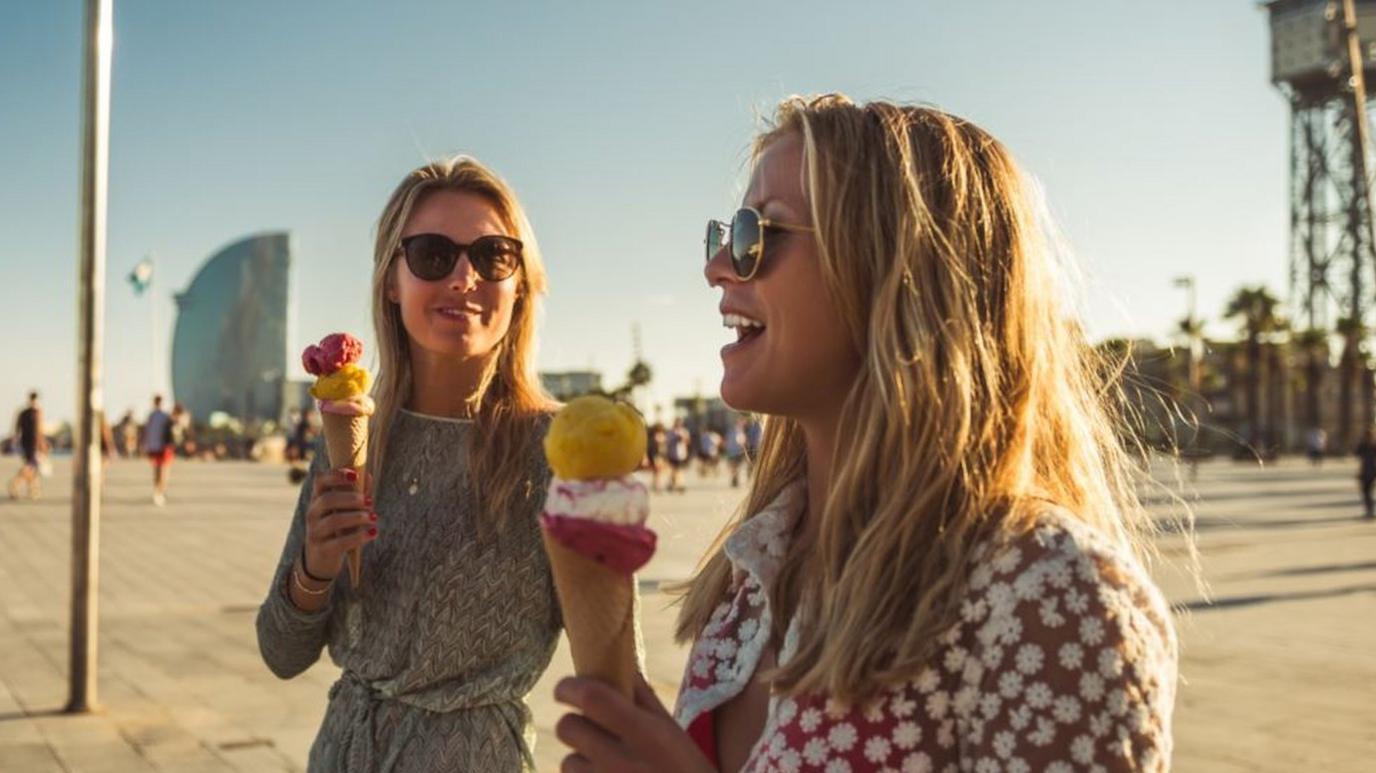Covid: EU should not 'build walls' around vaccines - Wallace
- Published
Mairead McGuinness told the BBC that all sides needed to "calm down" over Covid-19 vaccine row
The European Union should not "build walls" around the distribution of vaccines and should seek to meet its contractual "obligations", Defence Secretary Ben Wallace has told the BBC.
His comments follow a threat by the European Commission to block vaccine exports to countries including the UK.
EU Commissioner Mairead McGuinness said all sides needed to "calm down".
On Saturday, a record 873,784 combined first and second doses, external of Covid vaccines were given in the UK.
Prime Minister Boris Johnson said he wanted to thank "everyone involved" in the rollout.
Despite the vaccine progress, Mr Wallace did not rule out extending a ban on overseas holidays amid rising cases in other countries.
President of the European Commission, Ursula von der Leyen, said last week that if Covid vaccine supplies in Europe do not improve, the bloc "will reflect whether exports to countries who have higher vaccination rates than us are still proportionate".
Mr Wallace told the BBC's Andrew Marr Show that both the EU and the UK should live up to their contractual "obligations".
The defence secretary said: "The European Union stands for the rule of law... and that means we should all abide by our contracts. We are legally all obliged, both the buyer and the purchaser.
"The European Commission also recognises that the world is watching."
Mr Wallace said the language being used by the European Commission was "counterproductive", adding: "Trying to... build walls around this would only damage both EU citizens and United Kingdom."
Earlier this month, European Council President Charles Michel said the UK had imposed an "outright ban" on the export of vaccines and their components.
However, there is no ban and his claim was dismissed by the British government as "completely false".
Mrs von der Leyen said the EU is still waiting for exports from the UK, and it wants reciprocity.

Ms McGuinness told Andrew Marr: "I think all of us should put our hands up and say we were not prepared for this global pandemic. We did not do our best at the beginning but we are doing our best now to protect our citizens.
"I think we all need to, if you like, calm down, look very... dispassionately at the situation around the raw materials for vaccines, around where they are produced and how we might ramp up that production."
Also on Marr, shadow foreign secretary Lisa Nandy said it was "right to calm down" tensions over the issue.
"We do better when we work together - if we don't defeat the virus everywhere we are not going to defeat it anywhere. And there are new strains of the virus that are currently emerging.
"We may not be out of the woods with Covid yet and so we have to work together... cool the rhetoric," Ms Nandy said.
Some 41 million vaccine doses have been exported from the EU to 33 countries in six weeks, Mrs von der Leyen said, including more than 10 million which have gone to the UK.

SUPPORT BUBBLES: What are they and who can be in yours?
FACE MASKS: When do I need to wear one?
TESTING: What tests are available?

Following comments by government adviser Dr Mike Tildesley that summer holidays overseas are "extremely unlikely", Mr Wallace refused to rule out an extension to the foreign holiday ban.
"I think we will play it by ear. I'm not going to rule anything in or anything out," he said.
Mr Wallace added that it would be "premature" to book a trip abroad while we are "seeing growing variants".
Meanwhile, Dr Mary Ramsay, head of immunisation at Public Health England, said that restrictions could last for "quite a long period of time".
She told Marr: "We may eventually get back to a much more normal situation.
"But people have got used to those lower-level restrictions now, and people can live with them, and the economy can still go on with those less severe restrictions in place.
"So I think certainly for a few years, at least until other parts of the world are as well vaccinated as we are, and the numbers have come down everywhere that is when we may be able to go very gradually back to a more normal situation."

HAVE A LAZY LOCKDOWN SUNDAY WITH US: Check out the great selection of films on BBC iPlayer
COVID CONFIDENTIAL: How did the government make key decisions during the pandemic?

Related topics
- Published18 March 2021

- Published21 March 2021
